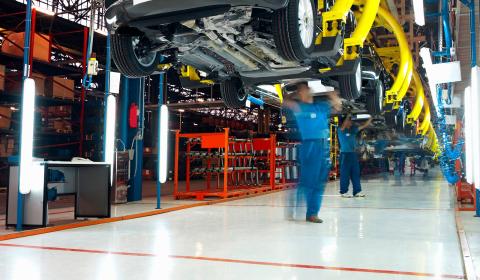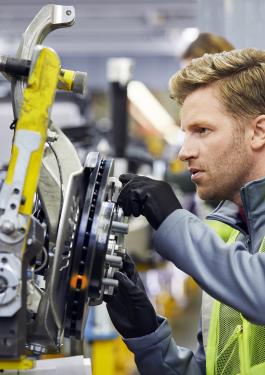
Transport supply chain disruption: how a quality management system can help
Today’s manufacturers of equipment and components for cars, trains and planes source raw materials and other supplies from companies all around the world. While a globalized supply chain has several advantages, it comes with increased risk.
The COVID-19 pandemic and subsequent surge in demand have highlighted significant vulnerabilities in the global supply chain: labor shortages, material scarcity, and shipping challenges have caused widespread disruption. The scale of this disruption raises the question: what steps can manufacturers take to recover and prepare for future crises?
Effectively handling disruption means ensuring that processes and contingency plans are in place to meet production targets. It means delivering products that meet standards, in the right timeframe. And it means continuing to provide customers with a high standard of service, even – and especially – during times of disruption. To do this, organizations must integrate resiliency into their supply chains. This is, fundamentally, a quality management issue.
Using a quality management system to steer through disruption
A quality management system (QMS) is, in its essence, a set of interacting processes, whose functionality and effectiveness are managed through the Plan-Do-Check-Act principle. When implemented as part of a robust QMS, these processes enable organizations to meet regulatory and industry requirements. From product quality control to customer service, a QMS can help identify vulnerable spots across all areas of an organization. In times of crisis, a well-designed QMS helps maintain quality standards and customer satisfaction.
The latest iteration of the global quality standard ISO 9001 emphasizes risk-based thinking and strategic planning. This enables businesses to identify risks they face as a result of specific situations and establish processes to manage them. For transport manufacturers, this could mean implementing procedures to ensure quality continuity if a part cannot be delivered on time, or in the event of an unforeseen plant closure.
In practice, this could take the form of a process to control document management. Centralizing supplier information – certifications, specifications, supplier quality agreements – enables transport manufacturers to determine instantly whether suppliers meet company and regulatory standards. In case of key supplier disruption or complete shutdown, clear document management helps manufacturers identify alternative suppliers with verified quality and compliance.
It could also take the form of an integrated IT process to improve communication and data accuracy. A cost recovery procedure to increase supply chain accountability. Or ensuring suppliers are delivering quality goods consistently by maintaining standardized supplier scorecards and conducting regular audits.[1]
While the consequences of the COVID-19 crisis were felt by industries globally, the effects on the transport sector were disastrous. European automotive sales finished 2020 around a quarter lower than in 2019[2]: the world’s two largest airline manufacturers delivered a combined 723 jets during the year, down over 40% compared to 2019[3].
Certifying to sector-specific QMS standards can bolster transport manufacturers’ resilience, better preparing them to deal with the negative repercussions of the crisis.
Ensuring quality across the automotive sector
The last several months have been marked by a global shortage of semiconductors – a key component in cars. This has caused massive disruption across automotive production lines. Car sales in Europe fell 23% in September 2021, as carmakers were unable to meet demand,[4] while manufacturing sites in Germany and other countries are facing temporary closure.[5] Meanwhile, operators such as chip packaging firm Unisem report that distributors who sell chips to auto manufacturers are willing to sign up for big price hikes[6] – a cost that is likely to filter down to the end customer. How can transport manufacturers manage the supply issue, while maintaining quality and ensuring customer satisfaction?
Implementing a quality management standard such as IATF 16949 for the automotive sector integrates risk-based thinking into all layers and processes of an organization. By identifying potential risks, manufacturers can devise a robust QMS to mitigate them. This ensures that when a crisis hits, processes are in place to manage disruption and meet customers’ evolving requirements. Centered on evidence-based decision making and the Plan-Do-Check-Act cycle, certifying to IATF 16949 helps defend automotive manufacturers against future shocks.
Getting the aerospace industry back off the ground
International and domestic travel restrictions sent the aerospace industry into hibernation during the pandemic. Disparate vaccination rates and travel restrictions across the world are making recovery slow, but the industry is making progress. In June 2021, only 25% of the global fleet was in storage, compared to 60% in April 2020.[7] As the industry upswing continues, airlines are feeling the urgency, but defects have been detected in some new planes. This has hit manufacturers with quality concerns, and caused recalls and further delays.[8]
A sector-specific QMS can provide visibility across the supply chain, ensuring that all suppliers are working to strict regulatory requirements and manufacturer quality specifications. This enables manufacturers to detect potential problems, and prevent them before they occur, limiting costly repercussions. Certifying to IAQG 9100 standards reassures customers of an organization’s commitment to quality, safety and reliability.
Managing growth and innovation in the rail industry
As the lowest emitting form of transportation, investment in the rail industry is seen by regulators as a key part of the solution for tackling climate change at a national level. As such, demand for rail infrastructure and rolling stock is growing. Yet against this rosy backdrop, high development costs and rapidly evolving demands can put pressure on rail manufacturers. To manage the challenges that come with growth and innovation in this sector, it is imperative to put processes in place to manage quality and risk.
A well-designed QMS enables train manufacturers to manage complex chains and achieve quality at all stages of a project, from design to construction and operations. Certification to ISO/TS 22163 helps players in the rail sector meet industry standards, while improving the performance of their organization and suppliers.
Taking action with Bureau Veritas
Supply chain disruption looks set to continue for the foreseeable future. Manufacturers must act to strengthen their systems, and a well-thought-out QMS can help them do that. The ability to handle crises and repair supply networks efficiently can provide a significant advantage – organizations that can recover more quickly than competitors may be able to capture a higher share of unmet demand and strengthen customer relationships.
Certification of a quality management system by Bureau Veritas demonstrates a commitment to quality and customer satisfaction. And it enables organizations to create a culture of prevention and risk management, driving efficiency throughout the business without reducing quality standards.
Want to find out more about our Quality Management Systems certification services? Learn more
SOURCES
[1] https://astrixinc.com/5-imperatives-of-effective-supplier-quality-management/
[2] https://www.acea.auto/figure/eu-passenger-car-production/
[3] Source: Airbus, Boeing financial results 2020
[4] https://www.ft.com/content/4fda08e3-6bc1-4ae8-9f80-83c48ac2b40e
[5] https://techxplore.com/news/2021-09-chip-shortage-spurs-car-closures.html
[6] https://www.reuters.com/technology/theyll-have-pay-malaysia-chip-crunch-triggers-new-era-supply-deals-2021-10-20/
[7] https://www.rolandberger.com/en/Insights/Publications/A-year-on-from-Covid-19-in-the-aviation-and-aerospace-industries.html
[8] https://www.reuters.com/business/aerospace-defense/boeing-deals-with-new-defect-787-dreamliner-wsj-2021-10-14/


